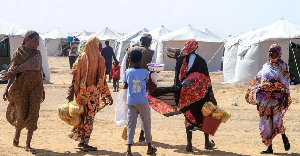The Christian Council of Ghana (CCG) has observed closely the ongoing debate on the Voters’ Register, and is happy about the interest shown by the various religious bodies, Civil Society Organisations (CSOs) and political parties on the matter.
However, the CCG is very much concerned about the fact that, the raging debate on the Voters’ Register has gradually overshadowed the need for the Electoral Commission (EC) to quickly undertake the necessary electoral reforms as recommended by the Supreme Court in the 2012 Election Petition Hearing and other CSOs.
Inasmuch as there is the need to ensure that the nation has a credible Voters’ Register, we must also not lose sight of the urgent need to equally engage the EC to quickly undertake the necessary electoral reforms and address the many challenges confronting our electoral process.
Legal Framework
The CCG is of the strongest opinion that, Ghana must quickly put in place a legal framework to address issues pertaining to elections, especially on electoral fraud. The Council is aware that the Constitution of Ghana makes provisions to address some electoral concerns; however, having a separate legal framework on elections will help address the many issues that often arise during elections.
In this regard, we can learn from the people of Kenya who have put in place an extensive legal framework to deal with electoral issues. Our country must quickly take a cue from the Kenyan example, and follow suit as we prepare for next year’s elections.
Such a legal framework, when put in place, will guide us as to when to create new districts and constituencies in order to avoid situations where new districts and constituencies are created few months to general elections. The creation of new districts and constituencies in 2012 created an unwarranted tension in the country, and having an electoral law that clearly dictates this will avoid some of the unnecessary tensions we experience in the country. This new law will also help the nation to deal with electoral fraud and also minimize such acts.
Logistics for Elections
In the past general elections, there have always been challenges with logistics for smooth electoral process. In 2012 for instance, there were several cases in which the Biometric Verification Machines did not work properly. It is therefore important for the EC to work at ensuring that whatever challenges that are with the machines are corrected, and additional back-up machines made available on time at every polling station.
The EC, together with other stakeholders should develop innovative ways to minimize the long hours and fatigue that voters have to endure before casting their votes.
The CCG urges the government to provide the EC with the necessary resources on time to enable it execute its mandate effectively.
Voter Education
Our past elections have often been characterized with pockets of violence, inducement, tensions and wastage of ballot papers.
In 1992, rejected ballots accounted for 3.6% of the valid votes cast. This reduced to 1.53% in the 1996. In the first round of the 2000 General Elections, it accounted for 1.8% of the valid votes counts but reduced to 1.58% during the Presidential Run-off. In 2004, it started souring up and constituted 2.2% of the votes cast while in 2008 it took a huge chunk of the votes recording an overall percentage of 2.4% of the valid votes cast. In the 2012 General Elections, 2.3% ballot papers were also rejected.
As we prepare for the 2016 general elections, it is important for the EC, religious bodies and other stakeholders to begin an extensive nationwide voter education and help citizens to vote on issues.
People must vote based on issues and not inducement with money or gifts by any politician. For this to happen, we have to deliberately educate our people on electoral processes and the need to avoid actions that will trigger tensions and violence. As a Council, we have started putting in place mechanisms to sensitize our members on elections.
Conclusion
As we continue to debate over the Voters’ Register, we urge the EC to show leadership in the debate and quickly take the necessary steps to undertake the various electoral reforms and address the many key electoral concerns expressed by the society.
In doing so, it must quickly consider the need to develop the legal framework to guide our elections as we prepare for the 2016 general elections.
As a non-partisan and neutral body, we will continue to support the EC to deliver on its mandate, while advocating for a peaceful, credible and transparent elections in Ghana.
The CCG assures the nation of its continuous prayers as we prepare for next year’s general elections.
S.G.D
Rev. Dr. Kwabena Opuni-Frimpong
General Secretary
General News of Thursday, 22 October 2015
Source: Christian Council of Ghana
Voters’ register debate must not eclipse electoral reforms – CCG
Entertainment












